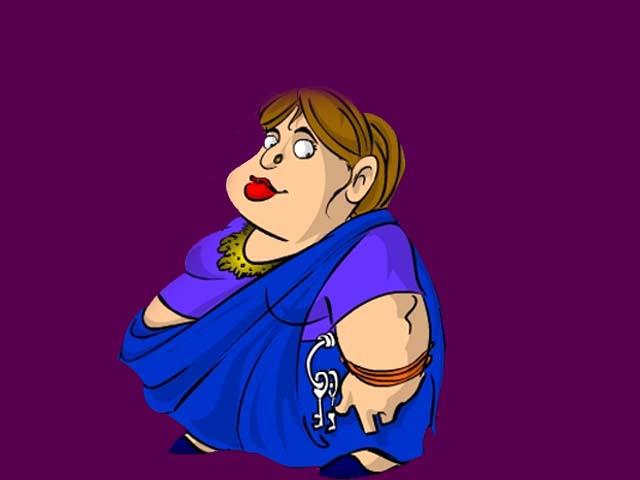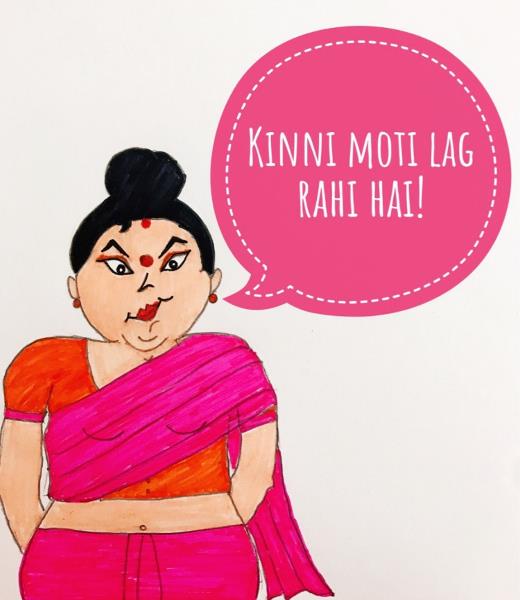
As far as the neighbourhood aunties are concerned, I refuse to answer why I am gaining weight anymore.
What the fat, Aunty ji?
“Why are you gaining weight?” What do they expect me to say? “Injecting lard into my body is my favourite pastime”?
Full disclosure: I was slim some time ago.
It happened slowly. I kept gaining weight over the last couple of years, until suddenly one day I was not thin anymore. The factors were pretty much the same as anyone else’s.
- An intense love for food. Cheese is the only thing I would call bae. Maybe even brownies!
- An equally intense dislike for exercise (I would rather curl up on the couch and read).
- In my case, Polycystic Ovarian Syndrome (PCOS), a hormonal disorder in which gaining weight is easier than losing it, among other more serious repercussions.
I was blissfully unaware of my weight until the neighbourhood aunties started pointing it out, making it seem like gaining a few kilograms was a personal insult to them. I don’t know if it happens in other cultures, but Assamese aunties love asking,
“Why are you gaining weight?”
 How about asking, how are you doing? It’s simple, really! Photo: Sashwati Bora
How about asking, how are you doing? It’s simple, really! Photo: Sashwati BoraWhat do they expect me to say?
“Injecting lard into my body every night is my favourite pastime!”
“I blame the cake.”
At my wedding two years ago, when someone asked my sister this question, I was furious.
“What kind of a question is that?” I argued, outraged on her behalf.
However, when I was asked the question, I was not outraged. The question stung. It bothered me more than I cared to admit.
I have always been an advocate of body positivity, believing with all my heart that we do great disservice to ourselves as well as others if we reduce our worth to a laundry list of how thin, pretty or fair we are.
And here I am, bothered by an obnoxious question from a couple of aunties I didn’t care much about. While I was whining about gaining a few kilograms, I shuddered thinking about people who were dealing with crippling self-doubt every day, people who gain more than a few kilograms, people who have to struggle with their weight/body image all their lives, people for whom ‘fat’ defines the trajectory of their lives.
It’s no secret that insecurities, even self-hatred, come gift-wrapped with love handles and stretch marks.
I wanted to know other stories, people who face debilitating criticisms and who, in spite of it all, beat their insecurities – the kind of people that I was not. So, I did what I usually do to solve the problem – I read.
 It’s also not okay to ask people if they’ve lost weight. Photo: Sashwati Bora)
It’s also not okay to ask people if they’ve lost weight. Photo: Sashwati Bora)I began by reading Lindy West’s Shrill. I read the entire book in mild horror as she narrated the painful detail of every cruel word and snide insinuation she faced. I only had to face my neighbourhood aunties; she had to contend with the internet.
However, despite the criticism and hateful attacks, it was surprising to find a hopeful note in her story. She believed that her biggest achievements were three instances where she made people rethink their behaviour, three instances when she drove home the point that rape jokes are not funny, fat jokes are not funny and that we cannot let people’s lives and struggles become the punch line of bad jokes.
I was, and still am, astounded that seemingly well-intentioned people have it in them to casually hurt others. Casual cruelty, I have noticed, comes easily to people. In today’s world, it has become normal. What does it take to be kind? We are struggling and failing and trying. The only difference is the type of problem.
Ask better questions
I still react to the question, but now it’s more anger than hurt. What the aunty jis are telling me is something I already know. I am not thin, weightless, hot, or Katrina Kaif.
What angers me is that the opening question or statement is never,
“What have you been up to lately?”
“It’s so good to see you.”
“How are you?”
The opening line when you meet someone is always and invariably,
“You have gained/lost weight.”
We must rethink whether we want to pass on our insecurities and our body image issues to our children. It is this fear that makes me not want to obsess in front of the mirror and for the first time in my life, acknowledge the importance of exercise for the sake of health and not just for the pointed finger on the weighing scale.
I fail a lot, but I do try. I write this with hope that perhaps in some way, I can contribute to the discourse. To borrow Lindy West’s words,
“The culture is ours to shape, if we try.”
And as far as the neighbourhood aunties are concerned, I refuse to answer why I am gaining weight anymore. Ask better questions.
This post originally appeared here.

COMMENTS (4)
Comments are moderated and generally will be posted if they are on-topic and not abusive.
For more information, please see our Comments FAQ